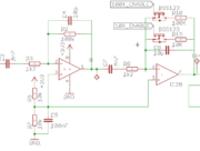reeraslan
Newbie level 4

I can properly amplify 40Khz ultrasonic signal using with mcp6022.
But later, I wanted to be able to amplify this signal with the gain in 4 different levels
This must be controlled by MCU
As the first picture, I thought I can switch the feedback resistors with MOSFETs. I fed the gate pin of BSS139 Mosfet with 1K on MCU pin
The idea of switching the MOSFET can change of Feedback resistor did not yield results.
1- Why is the solution in the picture not working properly when Mosfet is completely On ?

I will not use the digital potentiometer for cost reasons.I intend to implement the switching solution of resistors.
Here, I thought that analog switches or multiplexer , demultiplexers can be as a second method.
2- Can I use the 74h4051 IC as seen in the image for this question?


thanx
But later, I wanted to be able to amplify this signal with the gain in 4 different levels
This must be controlled by MCU
As the first picture, I thought I can switch the feedback resistors with MOSFETs. I fed the gate pin of BSS139 Mosfet with 1K on MCU pin
The idea of switching the MOSFET can change of Feedback resistor did not yield results.
1- Why is the solution in the picture not working properly when Mosfet is completely On ?

I will not use the digital potentiometer for cost reasons.I intend to implement the switching solution of resistors.
Here, I thought that analog switches or multiplexer , demultiplexers can be as a second method.
2- Can I use the 74h4051 IC as seen in the image for this question?


thanx
Last edited by a moderator:




